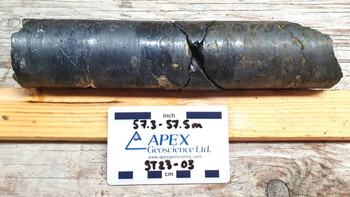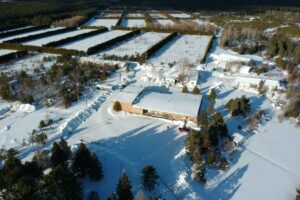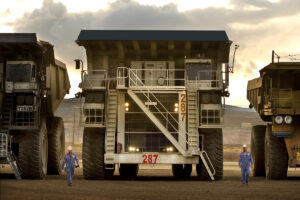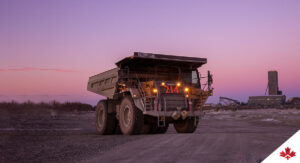American West Metals Ltd. Aug. 7 reported that the third hole of its 2023 deep drill program at Storm has made two significant discoveries on this high-grade copper project in Nunavut – a thick zone of near surface copper in an underexplored area of the project and deep copper horizon below it. “The diamond drilling at Storm continues to deliver, producing one of the best intersections ever seen at the project. Over 76m of near surface breccia copper sulphides with zones of massive sulphide have been intersected in the third diamond drill hole, ST23-03,” said American West Managing Director Dave O’Neill. “The drill hole has also – for the first time – intersected copper sulphides within the deeper horizon close to the southern graben fault, confirming the presence of the sediment-hosted system in new and untested areas.”One of the things that makes these intercepts even more significant is the location of the hole ST23-03 – about 1,000 meters west of 2750N, the nearest major zone of high-grade surface copper mineralization drilled so far, and more than 1,700 meters south of ST23-01, the nearest hole to encounter what is shaping up to be a much larger copper orebody that underlies the high-grade copper zones being outlined on the surface.”The thickness of the near-surface intersection – which includes massive copper sulphides – suggests the potential for a substantial volume of copper in this area that could significantly add to the open pit resources at Storm,” said O’Neill. “The deeper copper intersection is very significant from the perspective of understanding the overall copper endowment at Storm.”Thunder discovery resonatesThe most impressive of the two intercepts in hole ST23-03 is the strong near-surface copper that corresponds with an electromagnetic geophysical anomaly about 1,000 meters west of 2750N Zone.Starting at a depth of 32 meters this hole cut 76 meters of exceptionally strong breccia and vein style copper sulfides with broad zones of semi-massive to massive sulfides that are dominated by chalcocite, with bornite and chalcopyrite. Based on visual observations, this mineralization is similar to but more intense than what has been encountered by drilling at 2750N, including the 41 meters of 4.18% copper cut in hole ST22-05.”The new near surface copper zone has been named Thunder, which highlights the strength and significance of the discovery,” said O’Neill. The thickness and intensity of the mineralization at Thunder, along with the mineralization identified at the 2750N and 2200N to the east, suggests that the high-grade copper zones may be directly related to their proximity to the southern graben fault, which also parallels a large gravity geophysical anomaly where deeper copper mineralization is being discovered.Scale cannot be overstatedHole ST23-03 hit the deeper copper mineralization associated with the gravity anomaly at a depth of 273 meters.While this intercept was only two meters thick, it indicates the enormous size potential of the deeper zone being uncovered at Storm.American West says this deeper mineralized interval consists of broad fractures and dense veins of chalcocite, bornite, and chalcopyrite copper mineralization.”This confirms the prospectivity of the whole area around, and to the south of the southern graben fault,” said O’Neil. American West Metals Ltd.What makes this intercept even more important to the overall deep zone at Storm is the sediment-hosted copper mineralization encountered is visually very similar to what was observed in holes ST23-01 and ST23-02, which tested a large gravity anomaly associated with a parallel fault structure about 1,200 meters to the north. These faults are interpreted to be the primary source of plumbing for both the near-surface, and deeper copper mineralization.”With every wide-spaced hole encountering the same mineralised unit at depth, the scale potential of the copper system cannot be overstated,” the American West managing director added.With the deep drilling completed so far this year hitting deep copper mineralization associated with the gravity signature, the company has decided to carry out further gravity surveys over a 10-kilometer (six miles) corridor that extends to the Blizzard and Tornado prospect areas on the Storm property.Author Bio
Shane Lasley, Publisher
Over his more than 15 years of covering mining and mineral exploration, Shane has become renowned for his ability to report on the sector in a way that is technically sound enough to inform industry insiders while being easy to understand by a wider audience.
Email: [email protected] Phone: (907) 726-1095
This article was published by:
Visit the original article here



